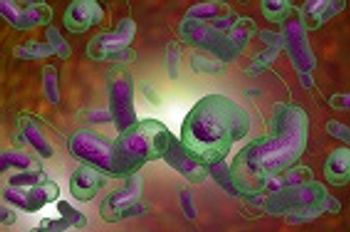
In the battle against drug-resistant pathogens, genetic research holds promising answers to our toughest threats. A new study shows that the best tool for treating Clostridium difficile infections could be within the genome of the bacteria itself.

In the battle against drug-resistant pathogens, genetic research holds promising answers to our toughest threats. A new study shows that the best tool for treating Clostridium difficile infections could be within the genome of the bacteria itself.

As the rise of antibiotic-resistant bacteria leads to higher rates of life-threatening infections from pathogens such Clostridium difficile and methicillin-resistant Staphylococcus aureus (MRSA), researchers are increasingly looking to probiotic treatment as an important part of fighting infections.

The city of Manchester, New Hampshire health department reopened its Crystal Lake public beach after previous analyses found elevated levels of E. coli.

A total of 808 cases of cholera have been found in the republic of South Sudan's capital city of Juba.

Approximately 20 staff members from an elementary school in Casselberry, Florida are believed to have contracted norovirus infections last week, a school official confirmed with Contagion.

The researchers analyzed stool samples from travelers, both before and after their trips, and found that the intestinal tracts of 76% were colonized with superbugs.

An ongoing outbreak of cholera in Rayagada, India has reportedly claimed the lives of 5 people in the region some 950 miles southeast of New Delhi.

A recent study has described the use of next-generation sequencing to develop novel approaches that could serve as a public health tool to track pathogens such as Escherichia coli during disease outbreaks.

A norovirus vaccine developed by Takeda is the first and only one to be tested in human trials.

A new bacteriophage (phage) treatment-based approach to fighting Clostridium difficile (C. difficile) colonization and infection may one day provide for effective treatment against this potentially lethal disease.

When a health emergency erupts somewhere in the world, the Centers for Disease Control and Prevention (CDC) quickly sends its new Global Rapid Response Team (Global RRT).

US travelers concerned about contracting cholera during overseas journeys to areas where the disease remains a threat may now have options as they seek to reduce their risk.

Each year, norovirus infection is responsible for an estimated 684 million episodes of diarrhea and 212,000 deaths worldwide, and results in approximately $4.2 billion in healthcare costs and $60.3 billion in societal costs, a new report has highlighted.

A new study has identified compounds that can reduce the virulence of the pathogenic bacterium Listeria monocytogenes.

Christina G. Tan, MD, MPH, FACP, NJ State Epidemiologist/Assistant Commissioner, discusses the alleged increase in food-borne infections.

The findings of a recent study suggest that knowledge of cholera and its symptoms is sorely lacking among female caretakers in the Indian sub-continent—despite the fact that the disease has been present in the region for centuries.

Treatment with SER-109 is considered to be effective in treating Clostridium difficile infection.

Several universities across the country and three cruise lines experience severe norovirus outbreaks, numbers totaling in the thousands.

Dorothy McCoy, PharmD, Clinical Associate Professor at the Ernest Mario School of Pharmacy at Rutgers University, explains why the norovirus spreads so efficiently.

A recent outbreak of Salmonella Muenchen in four states has prompted the Centers for Disease Control and Prevention (CDC) to partner with the US Food and Drug Administration to address the outbreak.

In just about 24 hours, the number of students at Ursinus College in Collegeville, Pennsylvania experiencing an unidentified stomach illness has increased from 40 to 174.

Chipotle is officially safe to dine at again.

From 2001 to 2010, the infection rate of a particular intestinal "superbug" has doubled, with increases in mortality rates and length of hospital stays reflecting this trend.

Hoping their discovery will lead to novel treatments, University of Florida researchers have successfully manufactured the human norovirus in a cell culture dish.